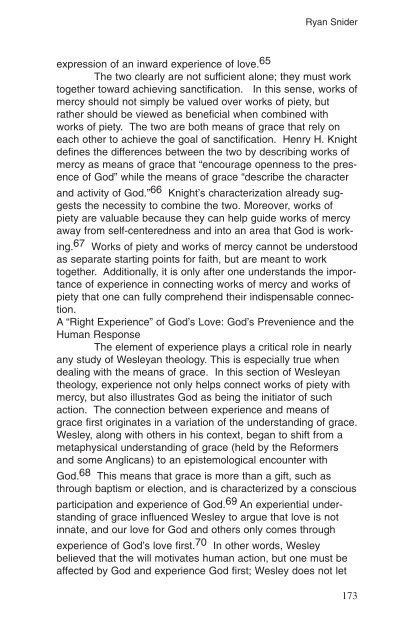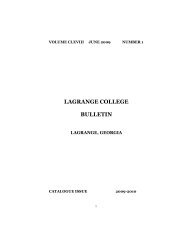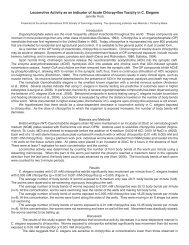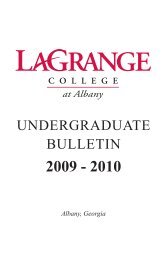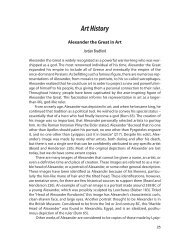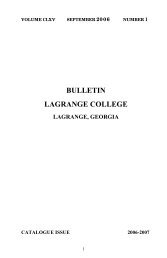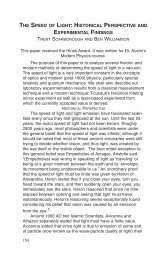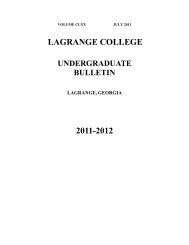Works of Mercy as a Vital Component to Sanctification - LaGrange ...
Works of Mercy as a Vital Component to Sanctification - LaGrange ...
Works of Mercy as a Vital Component to Sanctification - LaGrange ...
You also want an ePaper? Increase the reach of your titles
YUMPU automatically turns print PDFs into web optimized ePapers that Google loves.
Ryan Snider<br />
expression <strong>of</strong> an inward experience <strong>of</strong> love. 65<br />
The two clearly are not sufficient alone; they must work<br />
<strong>to</strong>gether <strong>to</strong>ward achieving sanctification. In this sense, works <strong>of</strong><br />
mercy should not simply be valued over works <strong>of</strong> piety, but<br />
rather should be viewed <strong>as</strong> beneficial when combined with<br />
works <strong>of</strong> piety. The two are both means <strong>of</strong> grace that rely on<br />
each other <strong>to</strong> achieve the goal <strong>of</strong> sanctification. Henry H. Knight<br />
defines the differences between the two by describing works <strong>of</strong><br />
mercy <strong>as</strong> means <strong>of</strong> grace that “encourage openness <strong>to</strong> the presence<br />
<strong>of</strong> God” while the means <strong>of</strong> grace “describe the character<br />
and activity <strong>of</strong> God.” 66 Knight’s characterization already suggests<br />
the necessity <strong>to</strong> combine the two. Moreover, works <strong>of</strong><br />
piety are valuable because they can help guide works <strong>of</strong> mercy<br />
away from self-centeredness and in<strong>to</strong> an area that God is working.<br />
67 <strong>Works</strong> <strong>of</strong> piety and works <strong>of</strong> mercy cannot be unders<strong>to</strong>od<br />
<strong>as</strong> separate starting points for faith, but are meant <strong>to</strong> work<br />
<strong>to</strong>gether. Additionally, it is only after one understands the importance<br />
<strong>of</strong> experience in connecting works <strong>of</strong> mercy and works <strong>of</strong><br />
piety that one can fully comprehend their indispensable connection.<br />
A “Right Experience” <strong>of</strong> God’s Love: God’s Prevenience and the<br />
Human Response<br />
The element <strong>of</strong> experience plays a critical role in nearly<br />
any study <strong>of</strong> Wesleyan theology. This is especially true when<br />
dealing with the means <strong>of</strong> grace. In this section <strong>of</strong> Wesleyan<br />
theology, experience not only helps connect works <strong>of</strong> piety with<br />
mercy, but also illustrates God <strong>as</strong> being the initia<strong>to</strong>r <strong>of</strong> such<br />
action. The connection between experience and means <strong>of</strong><br />
grace first originates in a variation <strong>of</strong> the understanding <strong>of</strong> grace.<br />
Wesley, along with others in his context, began <strong>to</strong> shift from a<br />
metaphysical understanding <strong>of</strong> grace (held by the Reformers<br />
and some Anglicans) <strong>to</strong> an epistemological encounter with<br />
God. 68 This means that grace is more than a gift, such <strong>as</strong><br />
through baptism or election, and is characterized by a conscious<br />
participation and experience <strong>of</strong> God. 69 An experiential understanding<br />
<strong>of</strong> grace influenced Wesley <strong>to</strong> argue that love is not<br />
innate, and our love for God and others only comes through<br />
experience <strong>of</strong> God’s love first. 70 In other words, Wesley<br />
believed that the will motivates human action, but one must be<br />
affected by God and experience God first; Wesley does not let<br />
173


